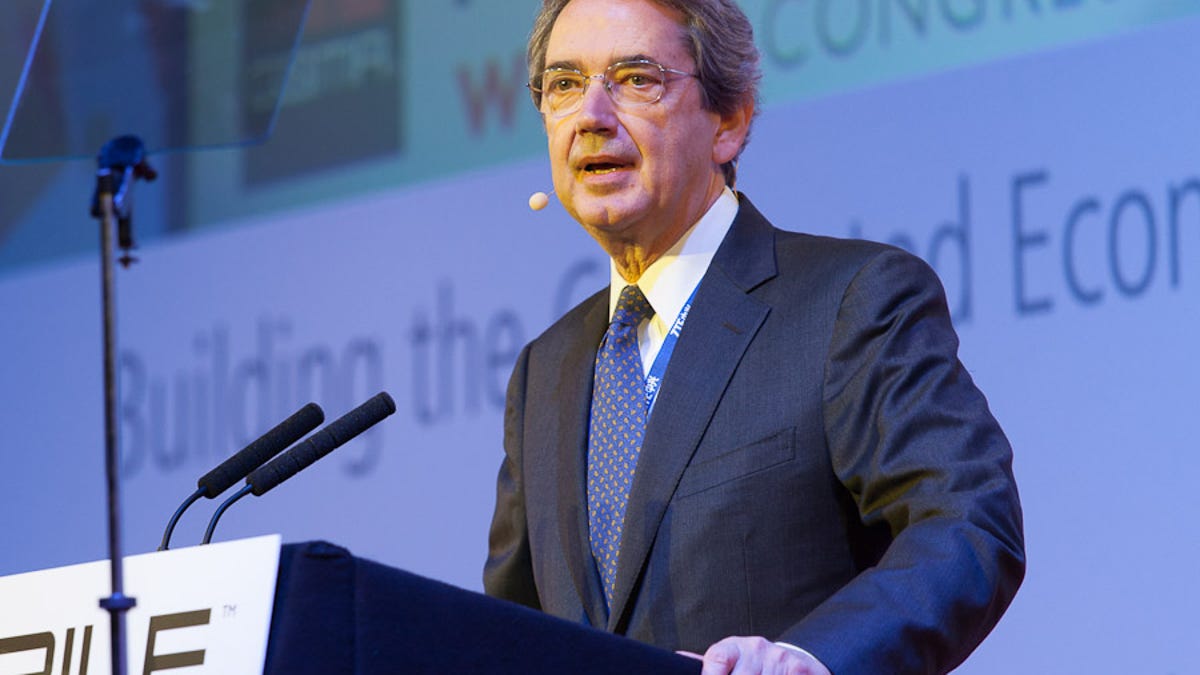Wireless CEOs warn of industry challenges, call for openness
The CEOs of Telecom Italia, China Mobile, Vodafone, and AT&T Mobility hit the common theme of a need to cooperate even as the industry faces regulatory and competitive pressure.

BARCELONA, Spain--Not everything is rosy in the wireless industry.
That's an unusual thing to say during the kickoff keynote address at Mobile World Congress, the world's largest wireless confab. Yet that's exactly what Franco Bernabe, CEO of Telecom Italia, said during his prepared remarks today.
"I don't want to say we're an industry with problems," Bernabe said. "We're still growing and we have a lot of opportunities. But we have a lot of challenges we need to face."
Bernabe was joined by China Mobile CEO Li Yue, Vodafone CEO Vittorio Colao, and Ralph de la Vega, CEO of AT&T's mobile business. The executives talked about the prospect of slowing revenue, higher regulatory, tax, and subsidy costs, as well as competition from over-the-top players offering content using their connections. They also called for more cooperation, both with each other and with developers and vendors, and brought up the social good the industry can bring.
Bernabe noted that over the next four years, the wireless industry will invest nearly $800 billion and contribute $2.3 trillion in public funding around world. Yet the industry continues to face stiff regulations from governments around the world.
"We really need to stop this autopilot regulation mentality that's still pervasive in many parts of the world," Colao said. "It's a legacy of the past."
Calls for regulatory easing and lower taxes aren't foreign concepts at mobile conferences, where the industry has often reiterated the stance that regulations are choking off growth and investment.
AT&T and de la Vega took the opportunity to again call for more spectrum--another common theme for wireless carriers--and the benefits that can come from freeing up more airwaves of mobile use.
"In order for us to grow, the first thing that has to happen is for spectrum to be made available," de la Vega said.
The companies also called for more openness--not something the carriers have talked about in the past. China Mobile's Yue said that one of the ways to overcome the industry's challenges is to work more closely with developers and vendors. He added that the cooperation is necessary to foster the new mobile lifestyle.
"We want to open up to all kinds of activities to promote services," he said through a translator. "We want to increase the user friendliness of our services."
De la Vega likewise touted AT&T's developer foundries--centers designed to foster new apps and mobile devices--and reiterated the company's promise to pour resources into this area.
Colao, meanwhile, announced a new mobile-payment service in partnership with Visa. He said that further cooperation and open standards are needed for services such as mobile payments to take off. Isis, a joint venture between three major carriers, said earlier today that it had signed deals with some major credit card players.
In areas such as security, openness is required to combat the looming threats, Bernabe said, noting that cloud services presents an opportunity for carriers to address potential problems.
De la Vega posed a challenge to carriers, calling for the need to make advanced services easier to use. He noted that mobile video as a communication tool is something consumers want, but acknowledged the industry needed to make the service easier to use.
The executives also talked about the benefits that the wireless industry can have on society. Colao noted that increased wireless penetration brings higher productivity in an economy. He also discussed the medical benefits, and the initiatives that Vodafone has led in bringing healthcare to poorer nations.
"(Mobile) health is an example of how the industry can address one of society's biggest challenges," Bernabe said.

